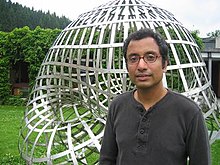Ravi Vakil
Ravi Vakil (born February 22, 1970 in Toronto ) is a Canadian mathematician who studies algebraic geometry .
Life
Vakil went to school in Etobicoke , Ontario and studied at the University of Toronto (Master's degree in 1992) and Harvard University , where he received his doctorate in 1997 with Joe Harris ( Enumerative geometry of curves via degeneration methods ). He then was an instructor at Princeton University and the Massachusetts Institute of Technology (1998 to 2001 as Moore instructor ). He has been Assistant Professor since 2001 and Professor at Stanford University since 2007 .
As a student, he was part of the Canadian team at the International Mathematical Olympiad , where he won two gold and one silver medals. As a student, he was a Putnam Fellow four times in a row as a result of the William Lowell Putnam Competition.
plant
He deals with many aspects of algebraic geometry, including the Schubert calculus of the enumerating geometry of algebraic curves in projective space (subject of one of the Hilbert problems ), where he solved some long open problems. He found, among other things, that all problems of counting points in the intersection of Schubert varieties in a complex Grassmann variety are of a real nature. He also dealt with Gromov-Witten invariants , intersection theory in the sense of William Fulton and Robert MacPherson, and modular spaces of curves and their singularities.
Prices
He was a Sloan Fellow, was a Packard Fellow from 2008 to 2013, received an AMS Centennial Fellowship in 2001/02, a Career Grant from the National Science Foundation from 2003 to 2008, and in 2005 he received the André Aisenstadt Prize from the Center de Recherches Mathématiques at the University of Toronto. In 2008 he received the Coxeter James Prize of the Canadian Mathematical Society and he received their G. de B. Robinson Award for Characteristic numbers of quartic plane curves . In it he solves the last part of a conjecture by Hieronymus Georg Zeuthen (1873) about the characteristic numbers of flat smooth curves of degree d (d less than or equal to 4), i.e. the number of these curves that go through a given points and b given straight lines as tangents (all in general position). In 2004 he received the US President's Presidential Early Career Award for Scientists and Engineers (PECASE).
In 2012 he received the Lester Randolph Ford Award . He is Polya Lecturer of the Mathematical Association of America (MAA) for the years 2012 to 2014. For 2014 he was awarded the Chauvenet Prize for The Mathematics of Doodling . Vakil is a Fellow of the American Mathematical Society .
Fonts
- A mathematical mosaic: patterns and problem solving . Mathematical Association of America (MAA), 1997, 2nd edition 2007
- with Kentaro Hori , Sheldon Katz , Albrecht Klemm , Rahul Pandharipande , Richard Thomas , Cumrun Vafa , Eric Zaslow : Mirror Symmetry . American Mathematical Society, 2003
- Editor: Snowbird Lectures in Algebraic Geometry . In: Contemporary Mathematics , Volume 388, American Mathematical Society, 2005 (Snowbird Conference 2004)
- with D. Abramovich, M. Marino, M. Thaddeus, K. Behrend, M. Manetti: Enumerative invariants in algebraic geometry and string theory . In: CIME Summer School 2005, Lecturenotes in Mathematics , Volume 1947, Springer Verlag 2008
- The moduli space of curves and its tautological ring . Notices AMS, June / July 2003
Web links
Individual evidence
- ↑ Ravi Vakil in the Mathematics Genealogy Project (English)
- ↑ He is also the author of The William Lowell Putnam Mathematics Competition 1985-2000: Problems, Solutions and Commentary , MAA 2002 , with Bjorn Poonen and K. Kedlaya
- ↑ Named after Hermann Schubert
- ↑ Vakil: Schubert induction , Annals of Mathematics, Volume 164, 2006, pp. 489-512, Preprint . Vakil, A. Knutson: A geometric Littlewood-Richardson rule . In: Annals of Mathematics , Volume 164, 2006, pp. 371-422, Preprint
- ↑ To receive the Aisenstadt Prize
- ↑ Can. J. Math. , Vol. 51, 1999, pp. 1089-1120
- ↑ List of the award winners. MAA , accessed January 3, 2017 .
- ↑ American Mathematical Monthly , Volume 118, 2011, No. 2, pp. 116-129
| personal data | |
|---|---|
| SURNAME | Vakil, Ravi |
| BRIEF DESCRIPTION | Canadian mathematician |
| DATE OF BIRTH | February 22, 1970 |
| PLACE OF BIRTH | Toronto |
